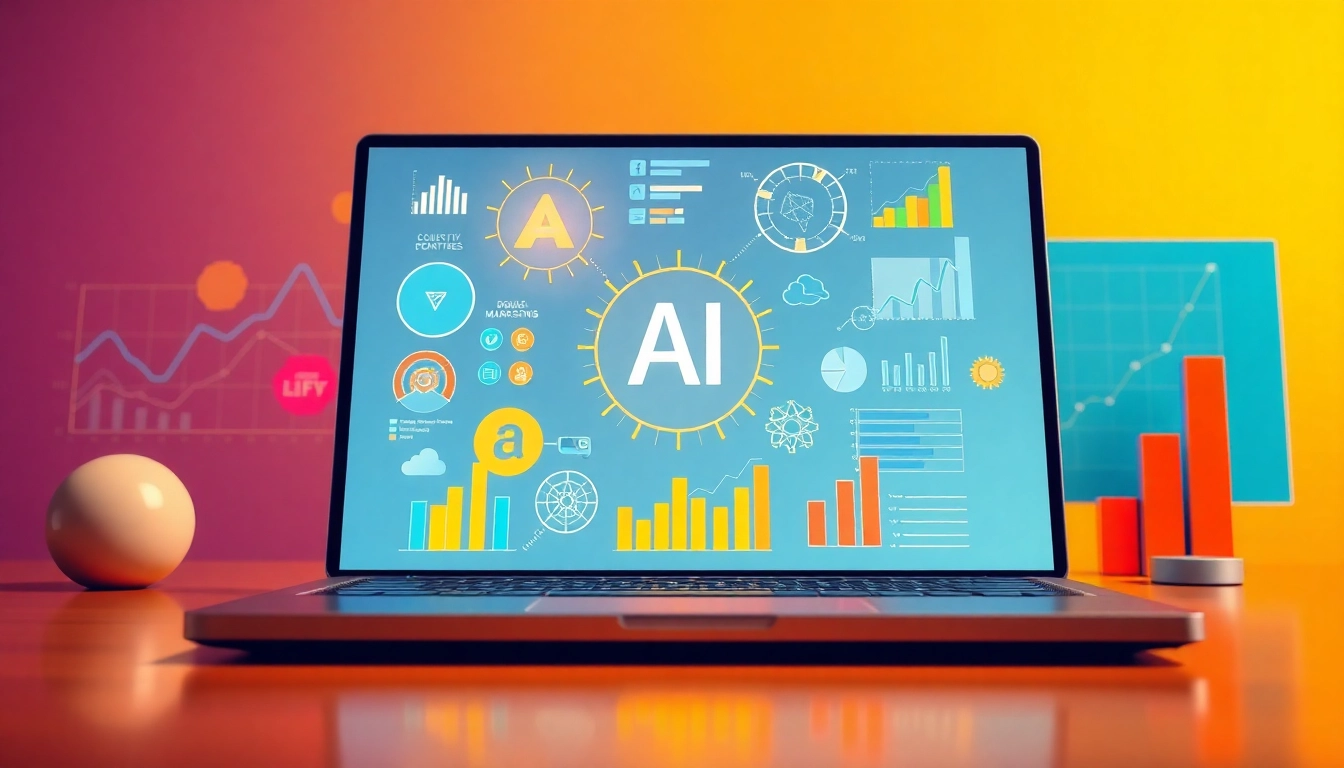Understanding AI Marketing Tools
As the digital landscape evolves, so does the importance of leveraging technology to stay competitive. AI marketing tools represent a significant shift in how businesses approach marketing, providing them with enhanced capabilities to analyze data, automate processes, and personalize customer interactions. Understanding these tools is essential for marketers who aim to optimize their strategies and improve their return on investment (ROI). This article dives deep into the realm of AI marketing tools, exploring their definition, significance, features, top applications, and the future trends that will shape their development.
What Are AI Marketing Tools?
AI marketing tools are software solutions that use artificial intelligence to optimize marketing tasks and processes. These tools can analyze vast amounts of data, facilitate targeted marketing, automate repetitive tasks, and enhance decision-making. From chatbots that provide customer support to complex algorithms that power predictive analytics, AI marketing tools encompass a broad range of applications that help marketers reach their goals more efficiently.
The Importance of AI in Marketing
The integration of AI in marketing is no longer a futuristic concept; it has become a vital necessity. AI enhances marketing by improving data analysis capabilities, allowing marketers to gain insights from customer behavior patterns, preferences, and trends. Furthermore, the automation of mundane tasks frees up valuable time for marketers to focus on strategy and creativity. As a result, businesses that harness the power of AI can expect improved customer engagement, higher conversion rates, and a more efficient allocation of resources.
How AI Tools Enhance Business Performance
AI marketing tools can significantly enhance a business’s performance in several ways. Firstly, they provide detailed analytics that helps businesses understand their customers’ needs and behaviors. This capability leads to better-targeted campaigns and products tailored to consumer preferences. Secondly, these tools increase operational efficiency by automating tasks such as email marketing, social media posting, and data reporting. Finally, AI helps in predicting customer behaviors, which empowers businesses to be proactive rather than reactive in their marketing strategies.
Key Features of Effective AI Marketing Tools
Automation and Efficiency
Automation is one of the most critical features of AI marketing tools. By automating tasks such as email marketing, content scheduling, and social media management, businesses can significantly reduce the time and resources spent on manual processes. For example, AI tools like HubSpot automate lead nurturing by sending targeted emails based on user behavior and preferences. Moreover, automation leads to fewer human errors and a more streamlined process, allowing marketers to operate more efficiently and effectively.
Data Analytics and Insights
The analytical capabilities of AI marketing tools allow businesses to derive valuable insights from vast datasets. Tools like Google Analytics use AI algorithms to analyze website traffic, user engagement, and conversion rates, providing businesses with informative dashboards and reports. These insights enable marketers to make data-driven decisions, optimize their strategies, and enhance customer targeting. Advanced AI tools also use predictive analytics to forecast trends, enabling businesses to adjust their marketing efforts proactively.
Personalization Capabilities
AI marketing tools excel in providing personalized experiences for customers. By analyzing user data, these tools can deliver tailored content, product recommendations, and targeted advertisements that resonate with individual preferences. For instance, platforms like Amazon utilize AI algorithms to suggest products based on a user’s browsing and purchasing history. This level of personalization not only enhances the customer experience but also increases conversion rates and fosters customer loyalty.
Top AI Marketing Tools for Businesses
Content Generation Tools
In the digital age, content is king. AI-powered content generation tools like Jasper and Writesonic provide marketers with the ability to create high-quality content rapidly. These tools use natural language processing to generate blog posts, social media updates, and even ad copy, saving marketers significant time and effort. Additionally, they can aid in optimizing content for SEO, ensuring that businesses can improve their online visibility effectively.
Social Media Marketing Solutions
Social media marketing is crucial for brand visibility and engagement. Tools like Buffer and Hootsuite employ AI to streamline social media management, allowing marketers to schedule posts, analyze performance metrics, and engage with followers seamlessly. AI can also help identify optimal posting times, suggest content topics, and improve audience targeting, thereby enhancing overall engagement and reach.
Email Marketing Automation Tools
Email marketing remains one of the most effective marketing channels. AI-driven tools like Mailchimp and ActiveCampaign automate email campaigns, segment audiences, and personalize content to enhance open and click rates. These tools analyze user interactions to determine the best times to send emails and what types of content resonate most with each segment, ultimately driving engagement and conversions.
Choosing the Right AI Tool for Your Needs
Assessing Your Marketing Goals
When selecting an AI marketing tool, the first step is to assess your business goals. Are you looking to enhance customer engagement, streamline operations, or improve lead generation? By clarifying your objectives, you can identify the features and functionalities you require from an AI tool, ensuring that your investment aligns closely with your marketing strategy.
Comparing Popular Options
With a myriad of AI marketing tools available, it’s essential to compare your options based on features, pricing, user reviews, and scalability. Consider creating a comparative analysis to evaluate how different tools meet your specific needs. Popular tools such as HubSpot, Salesforce, and SEMrush offer robust features for various marketing activities, and understanding the strengths and weaknesses of each can provide valuable insights into the best choice for your business.
Budget Considerations
Budget is a crucial factor in selecting the right AI marketing tool. It’s important to balance cost with the tool’s capabilities and the expected ROI. Many tools offer tiered pricing models, so you can choose a plan that fits your budget while still delivering valuable features. Additionally, consider any hidden costs such as training, additional features, or future upgrades when estimating your total investment.
Future Trends in AI Marketing Tools
Emerging Technologies to Watch
As AI technology continues to evolve, several emerging trends are shaping the future of AI marketing tools. Natural language processing (NLP), machine learning (ML), and deep learning are becoming more sophisticated, enabling marketers to engage in more personalized and informed customer interactions. Furthermore, advancements in predictive analytics will enable businesses to forecast market trends and consumer behaviors more accurately, which can inform strategic decisions.
Predictions for AI Marketing Growth
Industry experts predict substantial growth in the adoption of AI marketing tools in the coming years. As businesses seek more efficient ways to connect with their audiences, the implementation of AI technologies is expected to rise. According to recent surveys, over 80% of marketers believe that AI will significantly impact their marketing strategies, emphasizing the importance of preparing for this wave of transformation within the industry.
How to Stay Ahead in the AI Marketing Landscape
To remain competitive in the ever-evolving AI marketing landscape, businesses must stay informed about the latest tools and trends. Regular training and development for marketing teams will be essential to fully leverage AI capabilities. Furthermore, conducting regular audits of your AI tools and strategies can help identify new opportunities and areas for improvement, ensuring that your business adapts swiftly to changing market conditions.



